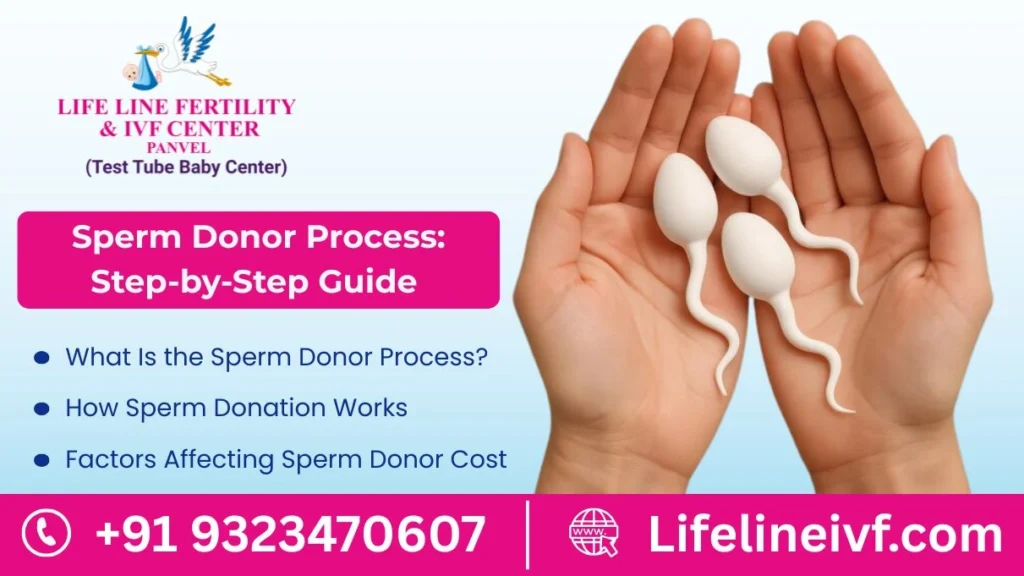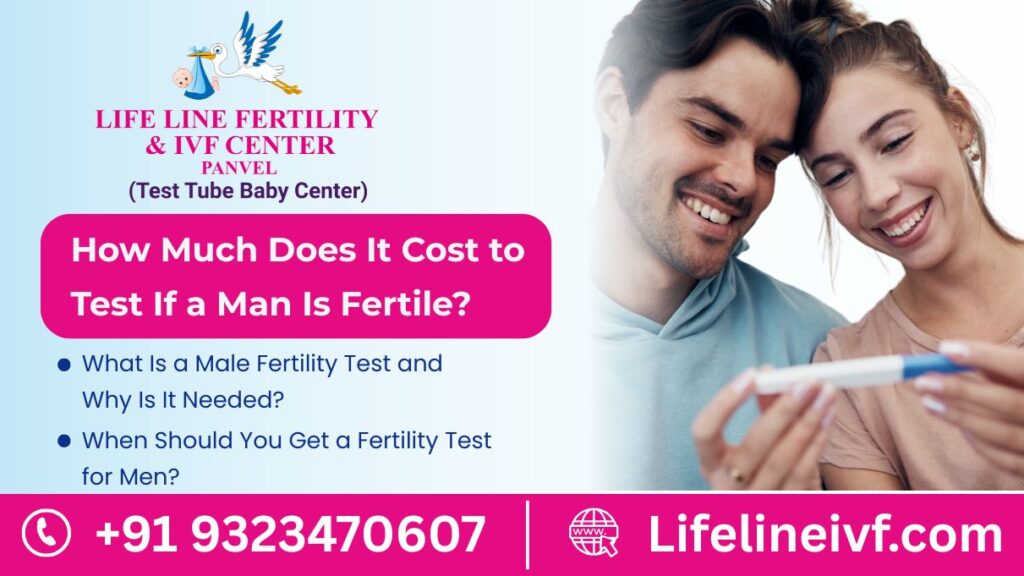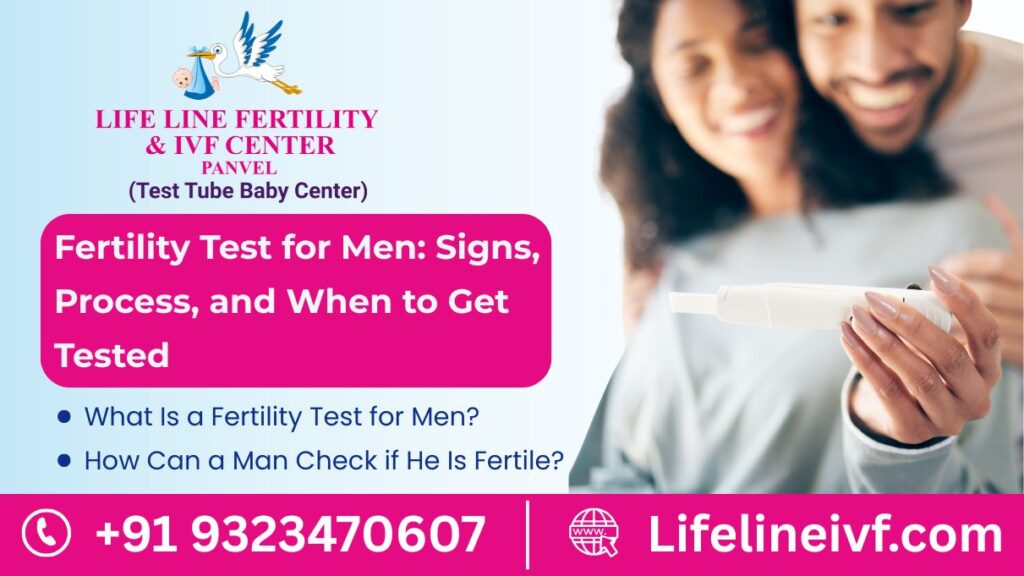Sperm Donor Process: Step-by-Step Guide | Lifeline IVF

Sperm Donor Process: Step-by-Step Guide at Lifeline IVF The sperm donor process is one of the most reliable fertility solutions for couples facing male infertility or genetic disorders. At Lifeline IVF, this process follows strict medical and ethical protocols to ensure safety, accuracy, and the highest chance of success. Whether it’s for IVF or artificial insemination, understanding each stage helps couples feel more confident and informed throughout their fertility journey. This guide breaks down every part of the sperm donor process, including donor selection, medical screening, and how sperm donation supports IVF treatments. What Is the Sperm Donor Process? The sperm donor process involves obtaining sperm from a healthy male donor that can be used to fertilize an egg through IVF or IUI. It’s often recommended for: Men with low sperm count or poor sperm quality Genetic conditions that could affect offspring Single women and same-sex couples who wish to have children The sperm donor is chosen based on detailed health checks, lifestyle, and genetic background. The sperm samples are then collected, tested, frozen, and used only after being cleared through quarantine and infection screening. Clinics like Lifeline IVF ensure every donor meets national medical standards set by the Indian Council of Medical Research (ICMR). This guarantees that every sample used is safe, tested, and medically suitable. The sperm donor process ultimately gives couples a safe, ethical, and effective route to parenthood. Step-by-Step Overview of the Sperm Donation Procedure The sperm donation process step by step includes multiple carefully controlled stages. Each phase ensures the donor and the recipient’s health are protected, and the chances of conception are maximized. Step 1 – Donor Screening and Selection Before donation, potential donors undergo comprehensive medical and psychological screening. Blood tests check for infectious diseases, and genetic testing screens for hereditary conditions. Clinics like Lifeline IVF also evaluate educational background and physical characteristics to match the donor with the recipient couple’s preferences. This ensures comfort and compatibility for both parties. Step 2 – Sperm Collection and Analysis The sperm donor procedure requires the donor to provide a semen sample in a sterile environment. The sample is tested for sperm count, motility, and structure to confirm quality. Samples meeting strict criteria are frozen using cryopreservation. Each batch is labeled with unique identification codes to maintain confidentiality and traceability. Step 3 – Quarantine and Retesting To ensure safety, donor samples are kept frozen for six months. After this period, the donor undergoes another round of testing. Only after the results are confirmed infection-free is the sample approved for use. This ensures that every sperm sample used in fertility treatment is safe, high-quality, and medically cleared. Step 4 – Fertilization and Embryo Transfer Once ready, the thawed donor sperm is used for IUI (Intrauterine Insemination) or IVF (In Vitro Fertilization), depending on the couple’s condition. In IVF, eggs are retrieved from the female partner and fertilized with donor sperm in a lab. The healthiest embryos are then transferred to the uterus to achieve pregnancy. How Sperm Donation Works for IVF and Couples The sperm donation process for IVF allows couples to conceive even when male fertility is compromised. The donor sperm acts as a substitute, fertilizing the eggs under controlled lab conditions. The sperm donation process for couples ensures emotional comfort and privacy. The donor is selected to resemble the male partner’s characteristics, making the child’s appearance and genetic background more relatable for the family. For IVF, donor sperm offers consistent quality and higher success rates compared to using low-quality sperm. The process is completely confidential, and all donor information remains anonymous under legal regulations. Clinics like Lifeline IVF manage the entire process with medical accuracy and emotional sensitivity, making the journey less stressful for both partners. Factors Affecting Sperm Donor Cost The sperm donor cost depends on several factors, including: The type of fertility treatment (IUI, IVF, or ICSI) The number of sperm vials required Donor screening, genetic testing, and storage duration Location and clinic reputation Clinics like Lifeline IVF maintain complete transparency regarding costs, ensuring patients understand the inclusions. Although the sperm donor cost can vary, investing in a reputed fertility center ensures quality care and a higher chance of conception. Choosing a certified clinic reduces the risk of medical complications and guarantees a safe experience. Many couples find this investment worthwhile when they experience the joy of achieving pregnancy through a reliable donor program. Why Choose Lifeline IVF for Donor Sperm Treatments? Lifeline IVF Panvel has earned the trust of countless couples through ethical practices, personalized care, and high success rates. Here’s why it’s one of the preferred centers for the sperm donor process: Registered donor bank with strict quality control Advanced fertility technologies and experienced specialists Anonymous and confidential donor matching Transparent pricing and affordable fertility plans Emotional counseling for couples undergoing treatment With an emphasis on patient safety and comfort, Lifeline IVF ensures that the entire sperm donation process for IVF is carried out smoothly and compassionately. Conclusion The sperm donor process offers hope to many couples and individuals who dream of starting a family. With careful medical screening, transparent procedures, and emotional support, it’s a safe and effective way to achieve pregnancy. At Lifeline IVF, every sperm donor procedure is handled with precision, care, and confidentiality. From donor selection to embryo transfer, the clinic prioritizes your comfort and success. Whether you’re exploring sperm donation for IVF or other fertility treatments, Lifeline IVF provides the right blend of advanced technology and compassionate care to help you experience the joy of parenthood. FAQs on Sperm Donor Process How long does the sperm donor process take? Typically, the process takes around 3–6 months, including donor screening, sperm collection, and quarantine. Is the donor’s identity ever revealed? No, donor anonymity is protected under ICMR regulations to maintain privacy for all parties involved. Can a sperm donor’s sample be used multiple times? Yes, but it’s limited to a small number of families to ensure genetic safety and compliance with guidelines. What is the success
How IVF Works Step by Step | IVF Treatment Process Guide

How IVF Works Step by Step For couples struggling with infertility, In Vitro Fertilization (IVF) offers a path to parenthood. This assisted reproductive technique involves fertilizing an egg with sperm outside the body and transferring the embryo into the uterus. Let’s break down how IVF works step by step from the initial consultation to the moment you wait for that positive pregnancy result. What is IVF and When is it Recommended? IVF is one of the most effective fertility treatments designed for couples facing challenges such as blocked fallopian tubes, low sperm count, ovulation disorders, or unexplained infertility. The process combines medical science and timing precision. When natural conception doesn’t occur, IVF treatment replicates the process in a controlled environment. It’s typically recommended for: Women with damaged or blocked fallopian tubes Men with poor sperm quality or motility Couples with unexplained infertility Individuals undergoing fertility preservation or donor cycles Understanding how IVF works step by step gives you confidence and clarity before beginning the journey. Step-by-Step Process of IVF Treatment Every IVF cycle follows a structured approach. Here’s what each stage involves: Step 1: Ovarian Stimulation The first step in how IVF works step by step involves stimulating the ovaries to produce multiple eggs. Fertility medications (gonadotropins) help mature more than one egg, increasing the chance of successful fertilization. During this phase, you’ll undergo: Hormone injections Blood tests Ultrasound scans to monitor follicle growth Once the follicles are ready, a “trigger shot” (hCG injection) prepares eggs for collection. Step 2: Egg Retrieval About 34–36 hours after the trigger shot, eggs are retrieved from the ovaries using a fine needle under light sedation. This short, painless procedure takes around 15–20 minutes. The retrieved eggs are immediately sent to the lab for fertilization. Egg retrieval is crucial in how IVF works step by step, as it ensures the best quality eggs are selected for fertilization. Step 3: Sperm Collection and Fertilization On the same day, a semen sample is collected. The best quality sperm are selected through advanced techniques. There are two main fertilization methods: Conventional IVF – Egg and sperm are combined naturally in a petri dish. ICSI (Intracytoplasmic Sperm Injection) – A single sperm is directly injected into an egg. This stage is the core of how IVF works step by step, as it marks the beginning of embryo formation. Step 4: Embryo Culture and Selection Fertilized eggs are cultured for 3–5 days in a controlled environment. Embryologists observe their growth and select the healthiest embryos. Advanced technologies like Blastocyst Culture or Embryo Grading help determine which embryo has the highest chance of successful implantation. Embryo selection plays a major role in IVF success and defines the quality outcome of how IVF works step by step. Step 5: Embryo Transfer The final and most anticipated step is embryo transfer. A selected embryo is placed into the uterus using a thin catheter. This procedure is painless and does not require anesthesia. After the transfer, patients are advised rest and prescribed hormonal support to help implantation. Two weeks later, a pregnancy test confirms if the cycle was successful. What Happens After the Embryo Transfer? After the transfer, it’s time to let nature take over. The embryo must attach to the uterine lining to begin pregnancy. During this stage: Avoid stress and physical strain Take prescribed medications regularly Eat a balanced, nutritious diet Emotional support is key. At Lifeline IVF, compassionate care continues beyond the procedure, helping couples through the crucial waiting phase. Success Rate and Factors Affecting IVF Results Success rates of IVF treatment vary depending on age, egg and sperm quality, and overall reproductive health. Typical IVF success rates range between 40%–60% for women under 35. However, several factors can influence results: Age and ovarian reserve Embryo quality Uterine health Lifestyle and stress levels Following medical advice, maintaining a healthy diet, and choosing an advanced fertility center like Lifeline IVF can significantly improve success chances. Why Choose Lifeline IVF for IVF Treatment? At Lifeline IVF Panvel, we provide personalized care and advanced reproductive technology to help every couple achieve their dream of parenthood. Our IVF treatment includes: Skilled embryologists and fertility specialists Modern lab facilities with precise temperature control Transparent treatment plans with emotional guidance Each IVF journey is unique, and our team ensures that every step from consultation to embryo transfer is handled with utmost care and accuracy. Conclusion How IVF works step by step may seem complex, but with the right medical guidance and emotional support, it becomes a hopeful journey. At Lifeline IVF, advanced reproductive care, ethical practice, and patient-first focus come together to turn dreams into reality one step at a time. FAQs on How IVF Works Step by Step How long does the IVF process take? A full IVF cycle typically takes 4–6 weeks, depending on your body’s response to medication. Is IVF painful? The procedures are mostly painless and done under light sedation. You might experience mild discomfort post retrieval. How many embryos are transferred in one cycle? Usually, 1–2 embryos are transferred based on age, medical history, and embryo quality. When can I take a pregnancy test after IVF? A blood test is done around 14 days after embryo transfer to confirm pregnancy. A full IVF cycle typically takes 4–6 weeks, depending on your body’s response to medication. The procedures are mostly painless and done under light sedation. You might experience mild discomfort post retrieval. Usually, 1–2 embryos are transferred based on age, medical history, and embryo quality. A blood test is done around 14 days after embryo transfer to confirm pregnancy.
How Many Injections for IVF Treatment | Lifeline IVF

How Many Injections for IVF Treatment? A Complete Guide When couples start IVF treatment, one of the first questions that comes up is — how many injections for IVF treatment are required? The truth is, the number of injections varies depending on your body’s response, your fertility plan, and the stage of treatment. This guide breaks down the complete IVF injection process, including how many injections are used, their purpose, and how long they last. Why Are Injections Needed During IVF? IVF injections play a crucial role in preparing the body for fertilization and implantation. These injections contain hormones that stimulate the ovaries to produce multiple eggs, increasing the chances of a successful pregnancy. The primary reason for using IVF injections is to control and enhance the ovulation cycle. Normally, a woman releases one egg each month, but with IVF, doctors aim for several eggs to increase success rates. The injections also help: Regulate hormone levels. Prevent premature ovulation. Support the uterus for embryo implantation. Each injection has a specific purpose — from stimulating egg growth to maintaining a healthy uterine lining. How Many Injections Are Given in an IVF Cycle? The number of injections in IVF treatment can differ for every woman, but typically, patients receive one to two injections daily for 8 to 12 days during the stimulation phase. That means you can expect between 20 to 30 injections per IVF cycle, depending on your response to medication. Here’s a breakdown: Ovarian stimulation phase : 8–12 days of hormone injections. Trigger shot : A single injection before egg retrieval. Progesterone phase : Daily injections or alternate support after embryo transfer. The total number can vary based on your fertility plan and medical condition. Your doctor at Lifeline IVF will customize your injection schedule for the best outcome. What Types of Injections Are Used in IVF Treatment? Several types of IVF injections are used at different stages. Each has a unique function in helping your body prepare for pregnancy. To understand how injections fit into the full journey, you can also explore our detailed guide on the IVF Treatment Process, which explains each stage from consultation to embryo transfer. Hormonal Stimulation Injections These are the first set of injections given during IVF. They contain follicle-stimulating hormone (FSH) and luteinizing hormone (LH) to encourage your ovaries to produce multiple eggs. Common brands include Gonal-F, Follistim, and Menopur. These are usually self-administered at home using a pen-like device, making the process more convenient and less painful. Trigger Shot Before Egg Retrieval Once the eggs are mature, your doctor will give a trigger shot that contains human chorionic gonadotropin (hCG). This injection helps the eggs complete their growth and get ready for retrieval. The timing is crucial — it’s usually given 36 hours before the egg retrieval procedure. Progesterone Injections After Embryo Transfer After embryo transfer, progesterone injections are given to prepare and support the uterine lining for implantation. These injections continue for two to three weeks after the transfer or until pregnancy is confirmed. How Long Do IVF Injections Last? The IVF injection process usually lasts around 10 to 14 days for the stimulation phase, followed by progesterone support for another 2–3 weeks. So, in total, IVF injections may continue for about 4 to 5 weeks depending on how your body responds. Some women may need fewer injections if their body reacts quickly to medication, while others might require more for proper egg growth. Your doctor monitors your hormone levels and follicle size through regular ultrasounds and blood tests to adjust doses accordingly. Tips to Manage IVF Injections Easily Many women feel anxious about taking daily injections, but with the right approach, it becomes manageable. Here are some useful tips: Schedule injections at the same time every day. Use ice to numb the area before injecting. Rotate injection sites to prevent soreness. Ask your partner or nurse for assistance if needed. Stay hydrated and follow your doctor’s instructions closely. Most patients find that discomfort decreases after the first few days as they become familiar with the routine. Why Choose Lifeline IVF for Your IVF Treatment At Lifeline IVF Panvel, our specialists ensure your IVF injection process is smooth, comfortable, and customized for your unique needs. We use advanced fertility protocols that reduce unnecessary injections while maintaining high success rates. Our supportive medical team guides you through every step — from your first consultation to post-treatment care. With state-of-the-art technology and compassionate care, Lifeline IVF provides a personalized experience that focuses on both your physical and emotional well-being. Learn more about our IVF Treatment here. FAQs on Male Fertility Test Cost Do all women need the same number of IVF injections? No, the number varies based on your fertility response and treatment protocol. Are IVF injections painful? Most patients report mild discomfort, similar to a vaccine shot, and it reduces over time. Can IVF injections be self-administered? Yes, most injections can be taken at home after proper instruction from your fertility nurse. What happens if I miss an IVF injection? Contact your fertility doctor immediately. Timing is crucial for IVF success. How long do IVF injections last in the body? Each injection’s effect lasts a few hours to a day, depending on the hormone type. No, the number varies based on your fertility response and treatment protocol. Most patients report mild discomfort, similar to a vaccine shot, and it reduces over time. Yes, most injections can be taken at home after proper instruction from your fertility nurse. Contact your fertility doctor immediately. Timing is crucial for IVF success. Each injection’s effect lasts a few hours to a day, depending on the hormone type. Conclusion The number of injections in IVF treatment depends on your individual fertility plan, but most women receive around 20–30 injections per cycle. While it may sound overwhelming, each injection plays a vital role in ensuring a successful outcome. With the right guidance and care at Lifeline IVF, you can go through the IVF journey confidently, knowing
Male Fertility Test Cost | Fertility Check-Up for Men

How Much Does It Cost to Test If a Man Is Fertile? When a couple faces challenges conceiving, it’s important for both partners to get tested. A male fertility test helps assess sperm health and other factors affecting conception.In India, the male fertility test cost varies based on the type of test and the fertility center.Understanding these costs helps you plan better and take timely steps toward parenthood.This guide explains different male fertility tests, price breakdowns, and why choosing a trusted center like Lifeline IVF matters. What Is a Male Fertility Test and Why Is It Needed? A male fertility test checks a man’s sperm count, quality, motility, and overall reproductive health. It’s recommended when a couple has been trying for more than 6 to 12 months without success.The fertility check-up cost for men depends on how detailed the evaluation is. A basic test may cover semen analysis, while an advanced one includes hormonal and genetic assessments. Common reasons for infertility in men include: Low sperm count or poor motility Hormonal imbalance Lifestyle factors like smoking or stress Varicocele or testicular issues Early testing helps detect the issue and increases the chances of successful treatment. What Factors Affect the Male Fertility Test Cost? The male fertility test cost in India isn’t the same everywhere. Several factors influence the total amount you may pay, such as: Type of tests : Basic semen analysis is cheaper compared to advanced hormonal or DNA tests. Location of clinic : Fertility centers in metro cities often charge more due to infrastructure and expertise. Technology used : Modern sperm analysis and computer-assisted semen testing increase accuracy but can cost more. Package inclusions : Some clinics include consultation and follow-ups in their fertility packages. Typically, the fertility test for men cost starts around ₹1,000 and may go up to ₹10,000 depending on what’s included. Common Types of Male Fertility Tests and Their Prices Semen Analysis This is the most basic and commonly done fertility test for men.It checks sperm count, movement, shape, and quality. The male fertility test price for semen analysis usually ranges from ₹800 to ₹2,000.Semen analysis gives a clear idea about the man’s reproductive potential and helps doctors decide on further tests if needed. Hormone Testing Hormones such as testosterone, FSH, and LH regulate sperm production. An imbalance can impact sperm health and lead to fertility issues. These tests generally cost between ₹1,500 and ₹3,500.If your semen analysis shows abnormalities or you experience low libido or fatigue, hormone testing becomes essential. Genetic and Imaging Tests For men with extremely low sperm counts, doctors may recommend genetic testing to detect chromosomal abnormalities. Scrotal ultrasound checks for blockages, infections, or varicocele. The fertility check-up cost for men for these advanced tests can range between ₹5,000 and ₹10,000. Average Male Fertility Test Cost in India Here’s a general cost overview across major cities: City Average Cost Mumbai 2,000 – 7,000 Delhi 1,800 – 6,000 Pune 1,500 – 5,000 Chennai 1,800 – 6,500 Bangalore 2,000 – 7,500 Many centers offer combined packages that include consultation and testing at a discounted rate. At Lifeline IVF, personalized male fertility test plans are available to suit individual needs and budgets. What’s Included in a Male Fertility Check-Up Package? A complete fertility check-up cost for men often includes: Semen analysis Hormonal testing Doctor consultation Scrotal ultrasound Physical examination Report discussion and treatment advice These packages give a complete understanding of male reproductive health. They also help identify if lifestyle or medical treatment is needed to improve fertility. When Should You Get a Fertility Test for Men? You should consider a fertility test for men if: You’ve been trying for a year without conception You have a history of genital infections or injuries You experience sexual health issues You’ve undergone chemotherapy or radiation You are above 35 and planning a family Getting tested early can save time and help you start suitable treatment sooner. Why Choose Lifeline IVF for Male Fertility Tests? Lifeline IVF Panvel is one of India’s trusted fertility centers offering comprehensive testing and treatment for men. Here’s why couples choose Lifeline IVF: Affordable Pricing : Transparent male fertility test cost with no hidden charges. Accurate Results : Advanced diagnostic tools ensure precise reports. Experienced Specialists : Qualified andrologists and fertility experts provide tailored advice. Confidential & Supportive Environment : Patient privacy and comfort are top priorities. Customized Fertility Packages : Options available for all budget levels and fertility needs. By choosing Lifeline IVF, you get accurate diagnosis, compassionate care, and complete support throughout your fertility journey. Conclusion The male fertility test cost depends on the type of evaluation you choose, but it’s an important step toward understanding reproductive health. Investing in a proper fertility check-up cost for men ensures that both diagnosis and treatment start early.At Lifeline IVF, every couple receives personalized care with affordable and reliable fertility testing options. If you’ve been trying to conceive, book your male fertility test today and take the first step toward a healthy pregnancy journey. FAQs on Male Fertility Test Cost What is the lowest male fertility test price in India? Basic semen analysis starts from ₹800 onwards. Does insurance cover male fertility testing? Generally, fertility tests are not covered by insurance unless linked to a medical issue. Can I take a fertility test at home? Home testing kits are available, but clinical tests provide more detailed and accurate results. How long does it take to get results? Most labs provide results within 1 to 2 working days. Do I need to repeat the test? If the results show low sperm count or motility, a repeat test may be recommended after 2–3 weeks. Basic semen analysis starts from ₹800 onwards. Generally, fertility tests are not covered by insurance unless linked to a medical issue. Home testing kits are available, but clinical tests provide more detailed and accurate results. Most labs provide results within 1 to 2 working days. If the results show low sperm count or motility, a repeat test may be
Fertility Test for Men | Lifeline IVF Male Fertility Care

Fertility Test for Men: Signs, Process, and When to Get Tested Male fertility is an important factor in conception, yet many men overlook it until they face challenges starting a family. A fertility test for men provides valuable information about sperm health, hormones, and reproductive function.Understanding male fertility is key because one-third of all infertility cases are due to male factors. Timely testing helps detect potential issues early and guides suitable treatment options.Whether you’re planning for a baby or facing difficulties conceiving, knowing how a male fertility test works and what it includes can make a big difference. What Is a Fertility Test for Men? A fertility test for men assesses the ability of sperm to fertilize an egg. It involves several diagnostic procedures that evaluate sperm quantity, quality, and function.Typically, doctors recommend the test after a couple has been trying to conceive for at least 12 months without success. But even before that, men can consider early testing to ensure everything is normal. The most common fertility tests for men include: Semen analysis : Examines sperm count, motility (movement), and morphology (shape). Hormonal tests : Measure testosterone and other reproductive hormones that regulate sperm production. Ultrasound : Detects structural problems like varicoceles or blockages. Genetic testing : Identifies hereditary issues that might affect fertility. Each test offers insight into a different aspect of reproductive health, helping specialists at Lifeline IVF tailor treatment for better outcomes. How Can a Man Check if He Is Fertile? Men can check fertility both at home and through clinical evaluation.At a clinic, the process starts with a fertility test for men, where a semen sample is collected and analyzed in a laboratory. The lab examines several key factors: Sperm count : The number of sperm in one milliliter of semen. Sperm motility : The ability of sperm to move efficiently toward the egg. Sperm morphology : The shape and structure of sperm, which affect fertilization capability. While home sperm test kits are available, they provide only limited information. A professional male fertility test offers a more accurate picture by including hormone analysis and imaging tests if necessary.Men experiencing symptoms like reduced sexual drive, testicular pain, or difficulty conceiving should consult a fertility specialist. At Lifeline IVF, advanced diagnostic tools and experienced doctors ensure reliable results. What Are the Signs of Male Infertility? Infertility in men may not always have visible symptoms, but several indicators can suggest reduced fertility. Common signs include: Difficulty conceiving after a year of regular intercourse. Abnormal semen results such as low sperm count. Testicular pain, swelling, or discomfort. Erectile dysfunction or low libido. Hormonal changes causing fatigue or loss of body hair. Lifestyle factors like smoking, alcohol, obesity, and chronic stress also contribute to male infertility. Prolonged exposure to heat, certain medications, or untreated infections can further reduce sperm quality.Taking a fertility test for men helps identify the root cause and guide treatment. Simple lifestyle improvements, such as eating antioxidant-rich foods, exercising, and avoiding toxins, can naturally enhance fertility. What Does a Male Fertility Test Include? A complete male fertility test covers multiple diagnostic stages to provide a clear overview of reproductive health. It typically includes: Physical examination : Checks for abnormalities in the testicles, veins, or prostate. Semen analysis : The most crucial step assessing sperm count, shape, and movement. Hormonal evaluation : Measures testosterone, LH, FSH, and prolactin levels to identify hormonal imbalances. Imaging tests : Ultrasound helps detect blockages or issues in the reproductive organs. Genetic testing : Determines if chromosomal problems are causing infertility. The results of a male fertility test help doctors understand whether the issue is sperm-related, hormonal, or structural.Knowing what does a male fertility test include prepares men for the process and removes anxiety. At Lifeline IVF, all tests are conducted in a safe, confidential environment with accurate results provided promptly. What Age Are Men Most Fertile? Men are typically most fertile between ages 25 and 35, when sperm motility, count, and structure are optimal. After age 40, sperm DNA fragmentation increases, which can lead to lower fertility and a higher risk of miscarriage or genetic abnormalities in offspring.However, it’s important to note that men can remain fertile throughout life, even into their 50s or 60s. The quality of sperm, however, tends to decline with age.Modern fertility treatments, such as ICSI (Intracytoplasmic Sperm Injection) or sperm washing, available at the best fertility clinic for men, can significantly improve conception chances even for older men.Maintaining good health, avoiding smoking, and keeping stress in check can help preserve fertility for longer. Why Choose Lifeline IVF – The Best Fertility Clinic for Men Lifeline IVF Panvel is recognized as one of the best fertility clinics for men in Mumbai, offering advanced diagnostic and treatment solutions. Here’s what makes Lifeline IVF stand out: Comprehensive fertility assessments tailored to each individual. State-of-the-art laboratory technology for accurate results. Treatments for all types of male infertility, including low sperm count and hormonal imbalance. Confidential consultations and personalized support throughout the process. Success-driven approach using evidence-based reproductive methods. By scheduling a fertility test for men at Lifeline IVF’s Male Fertility Clinic, you take the first step toward identifying and overcoming fertility challenges.Early diagnosis leads to better results—and greater peace of mind. FAQs on Fertility Test for Men How long does a male fertility test take? A semen analysis is completed in a few hours, and comprehensive results are usually ready within one or two days. Are fertility tests painful? No, a fertility test for men is completely non-invasive and painless. Can stress affect male fertility? Yes. Chronic stress can disrupt hormone levels, reducing sperm count and motility. Can male infertility be treated? In most cases, yes. Lifestyle changes, medication, or assisted reproductive techniques can restore fertility. How often should a man get tested? If you’ve been trying to conceive for over a year without success, it’s advisable to take a test. Men over 35 should also consider periodic testing. A semen analysis is completed in a few hours, and comprehensive
